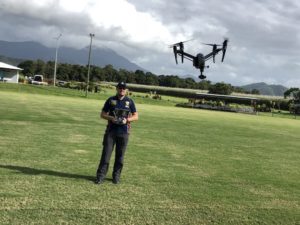Queensland Police Service, CC BY 4.0
DRONERESPONDERS and the Pilot Institute have partnered to provide training and resources on Part 107 for public safety professionals – and help agencies to get a Certificate of Authorization (COA) and build their drone program.
DRONERESPONDERS is the leading resource group for public safety and emergency services personnel: providing networking opportunities, working groups, and information resources. In a DRONERESPONDERS survey last year, first responders and emergency services professionals listed a lack of standardized training resources as one of the primary challenges that departments face in developing drone programs. That same research indicated that more than 80% of public safety UAS operators had received their Part 107 Remote Pilot Certification, or were working towards it. A new course from the Pilot Institute will provide training and study resources for Part 107 for public safety professionals – followed by training specific to running a public safety drone program, and information on getting a COA from the FAA.
The Pilot Institute Course
The course is designed in two parts. Module 1 will help public safety personnel earn their Part 107 certificate – with 15 hours of video training, a flashcard app to help students retain the information, and practice exams and quizzes. “This course was specifically designed and produced for public safety operators and it includes relevant examples. This is the most comprehensive course available and it will teach you the ‘why’ behind concepts so you’re truly prepared in the field,” says the Pilot Institute.
Module 2 of the course is free of charge for public safety professionals. “This module will be produced with DRONERESPONDERS and it will focus on the process for getting your Certificate of Authorization (COA). A COA is provided by the FAA to public safety agencies to give them additional privileges such as flying at night, in restricted airspace, from moving vehicles, beyond visual line of sight, and much more,” says the Pilot Institute.
In addition, participants can access the more than 400 documents in the DRONERESPONDERS Resource Center. These documents provide templates and information for public safety departments to set up the documentation and training programs that they need to operate legally and safely. “This includes documents to help you set up standard operating procedures, policy manuals, COA guidance, waiver templates, checklists, task books and more,” says the Pilot Institute. “DRONERESPONDERS has significantly reduced the complexity of setting up a drone operation for public safety users and their roadmap will make the process easier for you.”
Pilot Institute will provide financial assistance to DRONERESPONDERS with every sale. DRONERESPONDERS is a 501(c)3 non-profit and they focus on helping public safety agencies operate UAS.
Miriam McNabb is the Editor-in-Chief of DRONELIFE and CEO of JobForDrones, a professional drone services marketplace, and a fascinated observer of the emerging drone industry and the regulatory environment for drones. Miriam has penned over 3,000 articles focused on the commercial drone space and is an international speaker and recognized figure in the industry. Miriam has a degree from the University of Chicago and over 20 years of experience in high tech sales and marketing for new technologies.
For drone industry consulting or writing, Email Miriam.
TWITTER:@spaldingbarker
Subscribe to DroneLife here.
https://dronelife.com/2020/12/21/part-107-for-public-safety-professionals-droneresponders-and-pilot-institute-partner-for-education/
